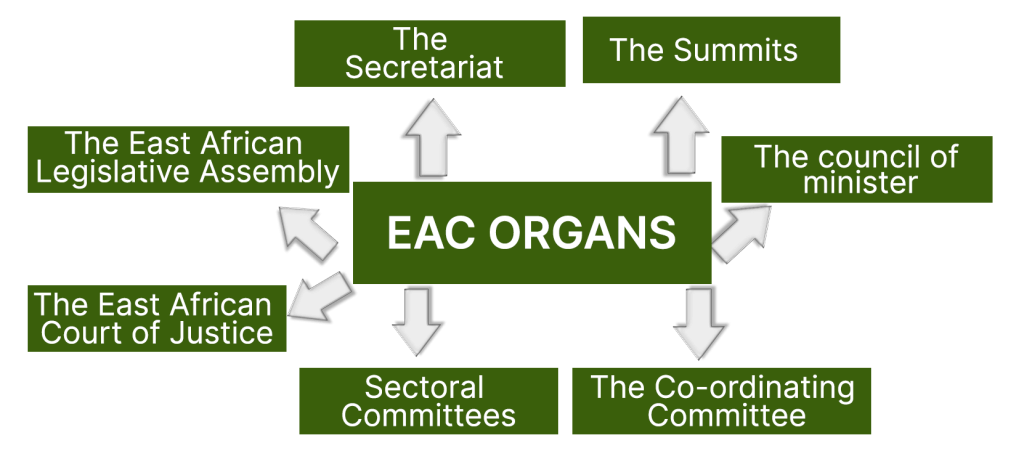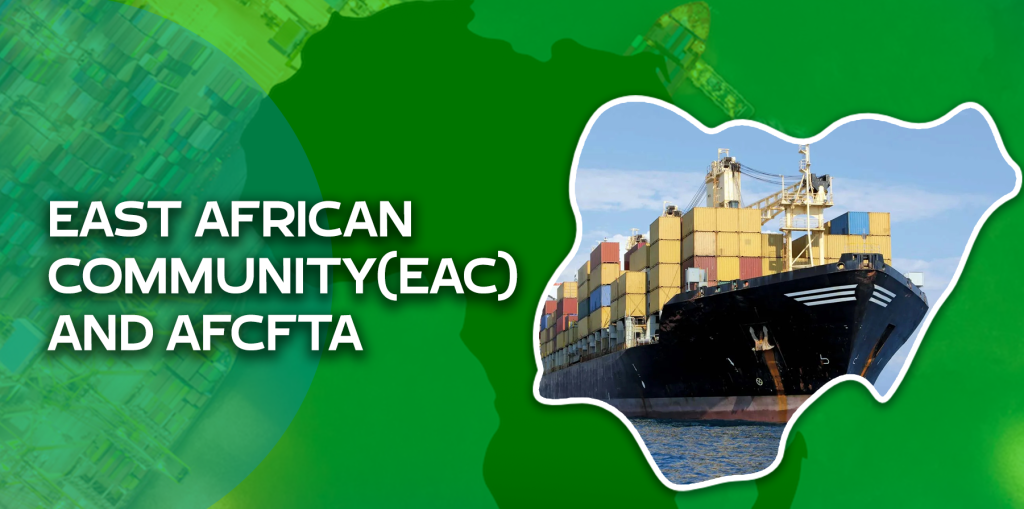East African Community (EAC) and AfCFTA
Welcome to our African Continental Free Trade Area (AfCFTA) Newsletter. In the previous edition, we discussed “Sahel-Saharan State Community (CEN-SAD) and AfCFTA”. In this edition, we would discuss extensively on the East African Community (EAC) and how it relates to AfCFTA.
The East Africa Community (EAC) is a regional intergovernmental organization of seven (7) partner states, comprising Burundi, the Democratic Republic of Congo, Kenya, Rwanda, South Sudan, Tanzania, and Uganda, with its headquarters in Arusha, Tanzania.

The EAC is home to an estimated 283.7 million citizens, of which nearly 30% live in urban areas. Its land area is 4.8 million square kilometers, and its combined Gross Domestic Product is $305.3 billion. This makes it a significant regional strategic asset and a potential source of much-needed economic growth.
The EAC’s work is guided by its Treaty, which established the Community. On 30 November 1999, the EAC Treaty was signed and entered into force on 7 July 2000 following its ratification by the original three Partner States – Kenya, Tanzania, and Uganda. The Republic of Rwanda and the Republic of Burundi joined the Community on 18 June 2007 becoming full Members of the Community with effect from 1 July 2007.
The Republic of South Sudan joined the Community on April 15, 2016 and became a full member on August 15, 2016. The Democratic Republic of the Congo became a full member on April 8, 2022, when it acceded to the EAC Treaty. On April 15, 2016, the Republic of South Sudan became a full member of the EAC. The Democratic Republic of Congo was admitted as a member on August 11, 2022.
The regional integration process is currently in full swing as evidenced by the progress made by the East African Customs Union, Common Market, and Monetary Union Protocol.
The first Regional Integration was the Custom Union, a critical foundation of the East African Community. It has been in force since 2005, as defined in Article 75 of the Treaty for the Establishment of the East African Community.
The EAC partners agree to establish free trade (or zero duty imposed) on goods and services among themselves, and they also agree to a Common External Tariff (CET), which means that imports from countries outside the EAC zones are subjected to the same tariff when sold in any EAC Partner State.
Goods moving freely within the EAC must meet certain Rules of Origin and comply with the protocol for the Establishment of the East African Community Customs Union.
The second Regional Integration milestone achieved by the East African Community was a common market that has been in force since 2010, in line with the provisions of the EAC Treaty. It became fully-fledges in January 2010 after the Customs Union.
To ensure growth and development acceleration, the EAC Partner State must maintain a liberal stance towards the four freedoms of movement for all the factors of production and two Rights between themselves. These Freedoms and Rights include:
- Free Movement of Goods
- Free Movement of Persons
- Free Movement of Labour / Workers
- Right of Establishment
- Right of Residence
- Free Movement of Services
- Free Movement of Capital
The EAC Common Market is based on the operational principles of the Community, namely:
1. Non-discrimination of nationals of other Partner States on grounds of nationality
2. Equal treatment to nationals of other Partner States
3. Ensure transparency in matters concerning the other Partner States; and
4. Share information for the smooth implementation of the Protocol.
The third part which is the East Africa Monetary Union (EAMU) is an important stage in the EAC Regional Integration process. The EAMU Protocol was adopted under the EAC Treaty and signed on 30th November 2013; it lays the groundwork for a monetary union within 10 years and allows the EAC Partners State to progressively converge their currencies into a single currency in the community.
In the process of archiving a single currency, the EAC Partner States aim to harmonize monetary and fiscal policies; harmonize financial, payment, and settlement systems; harmonize financial accounting and reporting practices; harmonize policies and standards on statistical information and establish an East African Central Bank.
The Political Federation is the fourth and final step of the EAC Regional Integration process, which is founded on three pillars: common foreign and security policies, good governance, and effective implementation of prior stages of Regional Integration. It should be noted that the attainment of political unity is a process and not an event.
East African Community is making progress in conformity with African Continental Free Trade Area (AfCFTA) requirements, with plans to finalize the EAC Tariff Offer underway.
Implementing the AfCFTA Agreement will require a complex, collaborative effort involving the expertise of all key stakeholders, including RECs. EAC Secretary General Hon. (Dr.) Peter Mathuki said that with a market of 1.3 billion consumers and a GDP of $3.4 trillion, AFCFTA provides opportunities to unlock trade in the continent and redesign its economic systems.
To benefit from the AfCFTA, EAC economies need to
1. Increase competitiveness to mitigate the negative impact of trade diversion.
2. Pursue policies that promote industrialization.
3. Compensate for the customs revenue loss by leveraging the envisaged increase in the trade volumes and value for other taxes.
In conclusion, projections show that the AfCFTA market is estimated to rise from US$1.27B to US$1.7B by 2030, out of which about US$600M will be in the middle class. East African Business Council (EABC) has urged the EAC to fast-track their AfCFTA negotiations for the region’s private sector to tap into the US$4T market.
If the negotiation can be hastened it will help businesses in the regions to take advantage of the 4 trillion AfCFTA consumer market.
Reference(s)
- “East African Community (EAC)”. African Union, accessed 28th October 2022.
- “ East African Community”. East African Community, accessed 29th October 2022.
- “African countries urged to prioritise infrastructure development to promote intra-continental trade”. East African Community, accessed 30th October 2022.
- “EAC bloc inches closer to finalising AfCFTA Tariff Offers”. East African Community, accessed 1st November 2022.
- “East African Community should integrate to benefit from AfCFTA”. FurtherAfrica, accessed 1st November 2022.
- “DR Congo joins East Africa trade bloc: Who gains?”. BBC News Services, accessed 3rd November 2022.

Africa can attract investments on back of AfCFTA – VPs, PMs assure
African governments have been challenged to go beyond talk and move into the implementation phase of the African Continental Free Trade Area (AfCFTA) in order to attract the needed investments.
READ MOREEAC MPs tell off EU Counterparts, Back Oil Pipeline Project
Former Tanzanian president John Magufuli (left) and Ugandan President Yoweri Museveni on November 9, 2017 listen to a presentation on the East Africa Crude Oil Pipeline project.
READ MORENigeria, others launch new Africa carbon markets initiative at COP 27
A new Africa Carbon Markets Initiative (ACMI) has been launched at the ongoing climate change summit in Egypt, which aims to support the growth of carbon credit production and create jobs in Africa.
READ MORENew naira notes: Good policy, bad timing
The bold plan by the Central Bank of Nigeria (CBN) to redesign and issue new naira notes by mid-December is not only shocking to Nigerians, it is wrongheaded and ill-timed.
READ MOREAfrica can attract investments on back of AfCFTA – VPs, PMs assure
African governments have been challenged to go beyond talk and move into the implementation phase of the African Continental Free Trade Area (AfCFTA) in order to attract the needed investments.
READ MORE
